The OWC Aura Pro X2 SSD Review: An NVMe Upgrade For Older Macs
by Billy Tallis on June 5, 2019 10:15 AM ESTAnandTech Storage Bench - Heavy
Our Heavy storage benchmark is proportionally more write-heavy than The Destroyer, but much shorter overall. The total writes in the Heavy test aren't enough to fill the drive, so performance never drops down to steady state. This test is far more representative of a power user's day to day usage, and is heavily influenced by the drive's peak performance. The Heavy workload test details can be found here. This test is run twice, once on a freshly erased drive and once after filling the drive with sequential writes.
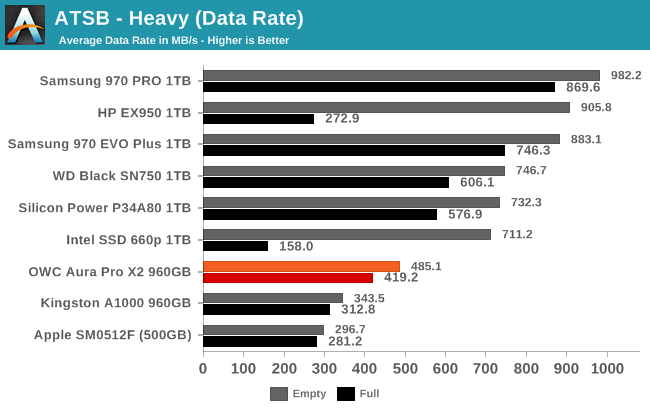
The average data rates for the OWC Aura Pro X2 on the Heavy test are not competitive with other current high-end NVMe drives, but at least it avoids the horrible full-drive performance we've seen from other SM2262EN drives. And it is still substantially faster than the older Apple SSD, for both full and empty drive test runs.
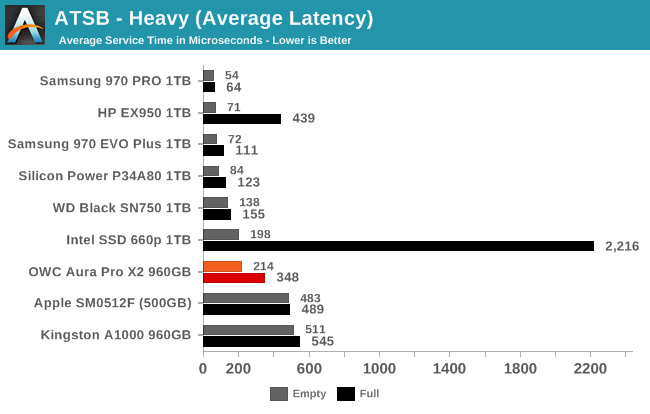
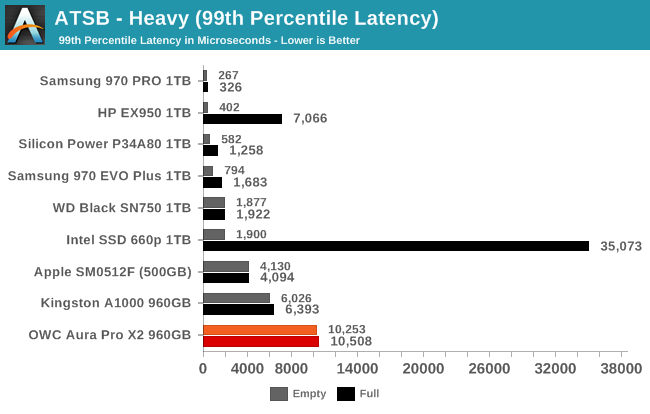
The 99th percentile latency problems with the Aura Pro X2 show up again on the Heavy test, but these would still be reasonable scores for a SATA SSD; it doesn't suffer like a full Intel 660p. Average latency is sub-par for what should be a high-end NVMe SSD, but is still an improvement over the older Apple drive and the current entry-level NVMe drives.
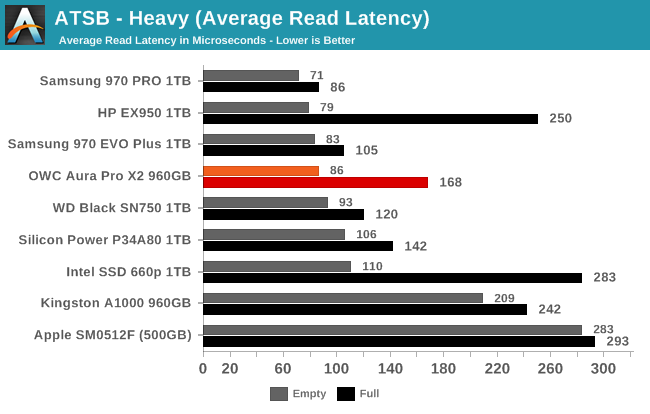
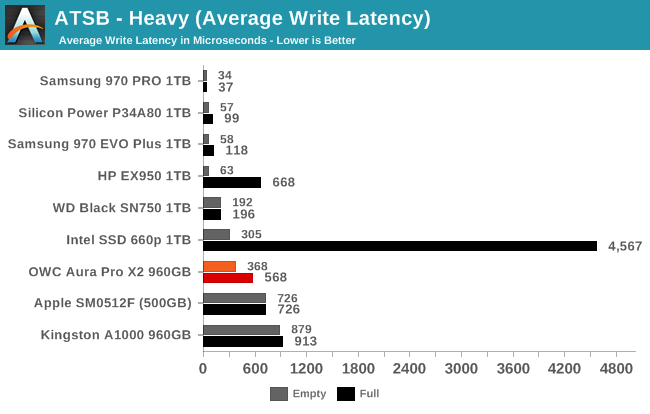
The average read and write latencies for the Aura Pro X2 are both a clear improvement over the Apple SSD but are nothing special compared to high-end M.2 NVMe SSDs.
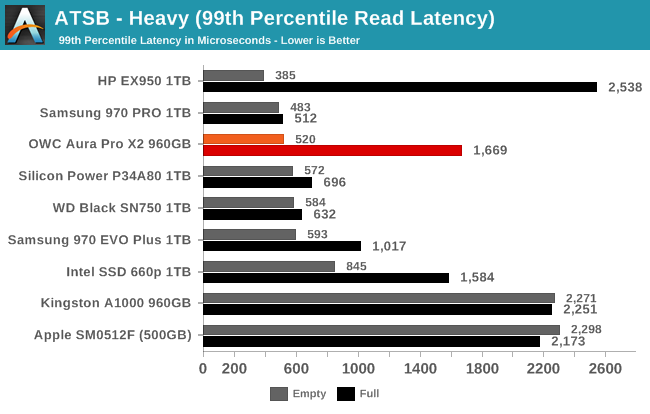
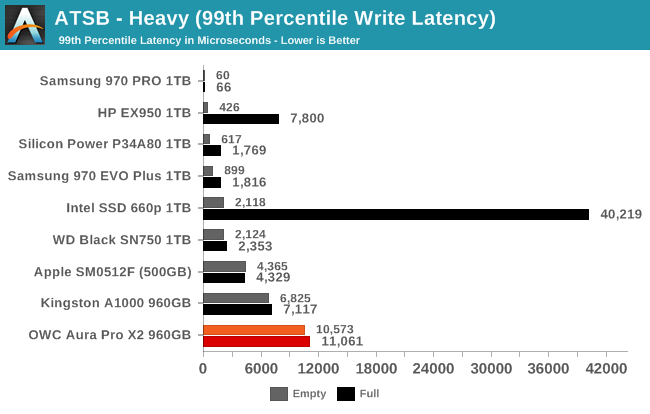
The OWC Aura Pro X2 has competitive QoS for read operations when the Heavy test is run on an empty drive, but when full the 99th percentile read latencies degrade to entry-level NVMe performance. The 99th percentile write latencies are poor for both test runs.
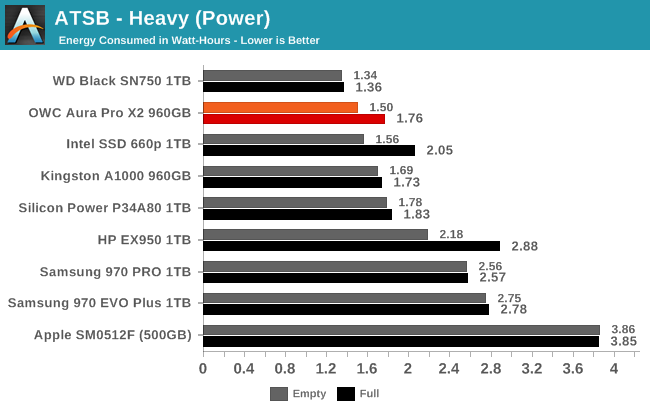
The Aura Pro X2 again ends up with pretty good power efficiency, coming close to the WD Black SN750 that sets the standard to beat for high-end NVMe drives. The Apple SSD stands out with much higher energy consumption than even the most power-hungry of the modern high-end M.2 drives, and to complete the Heavy test it requires more than twice the energy that the OWC drive uses.










32 Comments
View All Comments
danielfranklin - Thursday, June 6, 2019 - link
Exactly,What a load of crap marketing this in devices that do NOT support NVME properly in the firmware.
I expect more from OWC given the prices and that they are Mac specific.
Oxford Guy - Wednesday, June 5, 2019 - link
QLC is looking abominable here, particularly in the latency tests.nicolaim - Wednesday, June 5, 2019 - link
The sentence "The OWC Aura Pro X2 declares support all the usual power management features expected on a modern M.2 NVMe SSD, with two idle states that balance power savings against transition latency." is missing the word "for" and has an extra space.jabber - Thursday, June 6, 2019 - link
Apple Legal Team ban hammer in 5...4...3...2...Samus - Thursday, June 6, 2019 - link
Can they? I mean, OWC has been making these SSD's for YEARS without a threat from Apple. Clearly Apple doesn't believe they have a case.If anything this works in Apples favor because it is an easy way for them to void peoples warranties or refuse to service their PC's, much like they refuse to service iPhones with replacement 3rd party screens and batteries.
The_Assimilator - Friday, June 7, 2019 - link
Not to mention OWC is a large payer of the Apple Tax.playtech1 - Thursday, June 6, 2019 - link
I recently upgraded the SSDs in a 13 inch MBP and a 15 inch MBP, both from 2015. I upgraded the 13 inch MBP with a 1TB Apple SSD from eBay and the 15 inch MBP with a 2TB Intel 760p plus a Sintech short NVMe adapter.Both new SSDs work at roughly the same speed as the 512GB SSDs they replaced. However, I am considering ditching the 2TB SSD from the 15 inch MBP as it has reduced the battery life by several hours and increased the drain on standby. The Apple SSD in the 13 inch has had no negative side effects. I might hope that an OS update will bring with it better driver support for NVMe low power states, but it seems optimistic given that these models were never designed with NVMe in mind and it's something of a miracle that Apple ever enabled their use.
danzeb - Thursday, June 6, 2019 - link
I been looking into swapping out the ssd on my 13 inch 2015 MBP for a larger capacity one. Going by what I've read on the forums it seems increased battery drain is an unavoidable issue with NVMe drives when installed in our Macs. Would a third party AHCI drive have less power issues than a NVMe?maxtech567 - Thursday, June 6, 2019 - link
This review disregarded many crucial issues with OWC's Pro X2.Pro X2's issues:
1. You only get less 1500MB/s in most models (33 out of 38 supported models). Exceptions are 2015 MacBook Pro 15 and 4 iMac models, which are the lucky ones with PCIe 3.0 x4. They can take advantage of the full speed. Most other users are stuck with PCIe 2.0 x4, which is 1500MB/s.
I have a MacBook Air 2013. With the newly bought Pro X2 256GB, I'm only getting 1000MB/s write and 1500MB/s read. This is worse than most third-party solutions like Feather SSD from Fledging.
2. This solution has all flaws in an NVMe SSD (cannot wake up from hibernation, older boot ROM recognition, etc)
3. SM2262EN is one of the hottest controllers out there and significantly decreases battery life compare to SM2263XT or Phison E12
4. Even the destroyer test shows worse performance across the board in real life use cases comparing this SSD to Phison E12
Besides, the fitting on the adapter is overstated. There are plenty of short or low high ones that work perfectly without poking through the back.
burgerkingjr - Thursday, June 6, 2019 - link
Any chance of a comparison with the Transcend JetDrive 850 or 820?https://www.transcend-info.com/Products/No-956